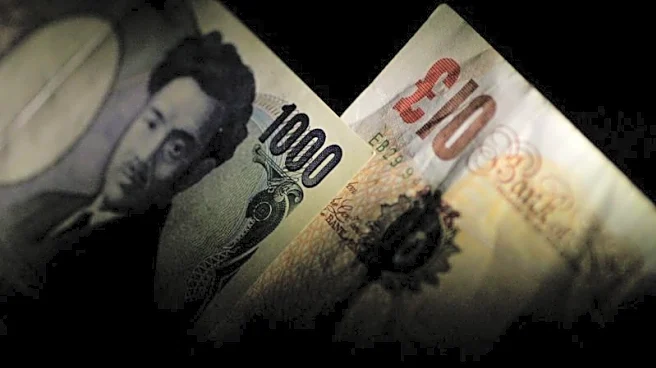By Rae Wee
SINGAPORE (Reuters) -The British pound and the yen came under pressure on Wednesday, following heavy selling stoked by renewed investor worries about the health of government finances globally
and political uncertainty in Japan.
Traders had dumped long-end government bonds in Europe and the U.S. in the previous session as focus once again shifted to rising debt levels across major economies, rekindling fears that governments around the world are losing their grip over fiscal deficits.
The selloff was stark in the gilt market as Britain's 30-year borrowing costs rose to their highest levels since 1998, which also left sterling vulnerable as it tumbled more than 1% on Tuesday. The pound last traded 0.12% lower at $1.3378.
"It's a problem Europe-wide, basically. I think France has got the same issues...it's been in the background for quite some time," said Ray Attrill, head of FX research at National Australia Bank, referring to the worsening fiscal positions of governments.
"It's probably resonating a bit more in the UK because of memories of the Liz Truss episode... I think part of the concern is that there's an autumn statement or a budget that's coming up.
"I think at this stage, there's a lack of confidence in markets that the government is willing to address effectively the scale of the budget deficit and the speed of debt buildup."
Over in Japan, the yen was similarly down 0.2% at 148.62 per dollar, having slid 0.8% in the previous session after the Japanese ruling party's secretary general Hiroshi Moriyama, a close aide to Prime Minister Shigeru Ishiba, said he intends to resign from his post.
That could potentially affect the fate of Ishiba, who has resisted calls to quit over an election loss.
"On the surface, political uncertainty, and the possibility that Prime Minister Shigeru Ishiba might resign in the coming days or weeks, is having a debilitating impact on the yen," said Kit Juckes, Societe Generale's chief global FX strategist.
Sanae Takaichi, one of the leading contenders to replace Ishiba, is known for favouring low domestic interest rates.
The slide in sterling and the yen in turn lifted the dollar, which last stood at 98.44 against a basket of currencies having gained 0.66% on Tuesday.
The euro was down 0.1% at $1.1630, extending its 0.6% fall from the previous session, while the Australian dollar similarly eased 0.1% to $0.6514.
The New Zealand dollar last traded 0.14% lower at $0.5857.
Fiscal and political worries aside, investors also had their eye on a slew of U.S. labour market data releases this week, headlined by Friday's nonfarm payrolls report.
That could provide investors and the Federal Reserve a clearer picture of the labour market that has become the centre of policy debate, and could either underscore or cast doubt on expectations of a rate cut later this month.
The two-year U.S. Treasury yield, which typically reflects near-term rate expectations, eased slightly to 3.6495% on Wednesday, though the 30-year yield was just a whisker away from the 5% level, in line with the global rise in long-end bond yields.
(Reporting by Rae Wee; Editing by Sam Holmes)









